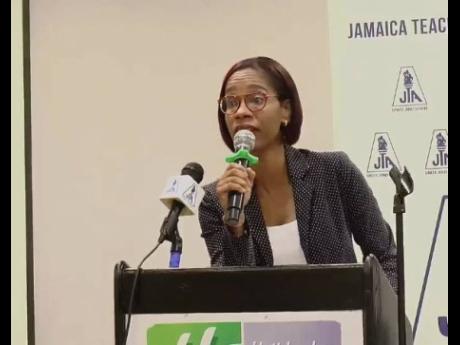Teachers urged to practise self-care or risk burnout
WESTERN BUREAU:
Communications professional Simone Clarke-Cooper is urging teachers to ensure that they see to their own well-being even as they try to teach their students in the aftermath of the COVID-19 pandemic, lest the educators suffer burnout and health complications due to stress.
Clarke-Cooper, chief executive officer of SimSpeak Communication Services Limited, was giving the keynote address at the opening session of the Jamaica Teachers’ Association’s (JTA) annual Helen Stills Professional Day celebration, held at the Holiday Inn Resort in Montego Bay, St James.
The session was hosted as part of activities for Education Week 2022, held under this year’s theme, ‘Celebrating Me: Embracing Self-care for Sustainable Health and Wellness’.
“We tend to look a lot at our students and say, ‘Boy, the learning loss is so great and the children are suffering’. But who is talking about what our teachers are going through? How many of you have asked in the last two years, ‘Why am I still a teacher? Why am I still in Jamaica? Do I stay in Jamaica forever? Do I stay in teaching?’” Clarke-Cooper asked while addressing teachers at the function.
“Self-care is so important in the grand scheme of things, and that is what will keep you going. Teachers are teaching, ‘guidance counselling’, nursing, doctoring, and supporting financially; and if you find that all people want to do is criticise, then you have to self-celebrate and build each other up even as you build yourself up,” Clarke-Cooper added.
IMPROVE PROFESSIONALLY
She noted that teachers’ ability to see to their own well-being and manage burnout will help them to improve professionally as well as physically.
“Often, the work takes precedence over everything, and our desire to succeed pushes us to set aside our own well-being. But creating a harmonious work-life balance is critical to improve not only our physical, emotional and mental well-being, but it is also important for our career because you are not burned out,” said Clarke-Cooper. “Stress and burnout will kill you. What are you doing to mitigate those feelings? Because you cannot teach if you are dead.”
Her remarks came after JTA President Winston Smith told the meeting that teachers must be properly compensated for their efforts or else they cannot retain any love for their vocation.
“Many people think that we are in the profession for the love only, and as such are reluctant to give teachers a liveable wage. But I submit to those who are of that view that no matter how much we love the profession, and yes we do, if we are dead from starvation, we will not be able to love it any more,” said Smith.
Both speakers’ remarks follow more than two years of teachers having to engage their students in virtual classes due to the COVID-19 pandemic. Some of the challenges which educators faced during that time included difficulties in reaching some of their students, among them those who have not been engaged in online learning despite the Ministry of Education’s efforts, and in supplying physical material for some students to complete assignments.
Last August, in his inaugural address as JTA president, Smith warned that being blamed for the shortfalls of the education sector, while having to juggle their professional obligations with their personal commitments, would take a toll on teachers’ mental health.
The risk of Jamaica’s teachers falling victim to stress had previously been addressed in 2019, when then JTA President Dr Garth Anderson urged educators to utilise any and all available counselling services for themselves, so as not to take their frustrations out on students. At that time, teachers had said that they were not aware of any organisation, including the JTA, providing counselling or other means of care for them.

